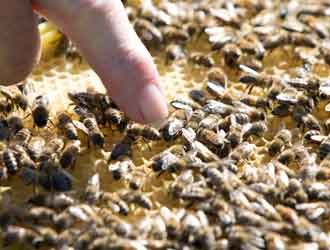Island beekeepers warn of crisis: 90 per cent of colonies wiped out.
Almost 90 per cent of colonies wiped out over winter, some say
By Katie DeRosa, Times Colonist March 8, 2010
Vancouver Island beekeepers are reeling from the worst commercial honeybee die-off in recent memory, with some estimating almost 90 per cent of colonies have been wiped out in the last few months.
Many blame a harmful parasite called varroa mites that has become immune to some pesticides, and fear the shortage of bees could affect spring pollination.
"The amount of bees that have been lost is just phenomenal," said Sol Nowitz, a veteran commercial beekeeper who breeds bees and produces honey at the Jingle Pot Apiary in Nanaimo. "It's the biggest catastrophe to kill bees on the Island ever."
He estimates there are between 2,000 and 3,000 colonies on the Island, about a quarter of the 12,000 colonies that flourished a few years ago. In 2007, Nowitz had 275 colonies. Now left with 15, he is sold out of honey and can no longer afford to sell bees to other beekeepers.
Steve Mitchell, owner of Bee Haven Farms in Duncan, said he started out the winter with 18 colonies and came out with one. "Other [farmers] lost their whole stocks," he said.
Nowitz said the hardest-hit areas are in Nanaimo and the mid-Island.
The last major die-off was in 2007 and 2008, when some breeders lost 55 to 65 per cent of their stock. This year, however, the almost total depletion is a full-blown disaster, Nowitz said.
The mites were first discovered on the Island in 1997 and have wreaked havoc on honeybees since. They infect the bees' immune systems, making them more susceptible to viruses and deformed wings.
But Stan Reist, president of the B.C. Honey Producers Association, said a variety of factors contribute to the deaths — including a late fall harvest that tires out the bees and the timing of pesticide treatments.
Some fear honey producers will be forced to raise prices or abandon the business altogether.
Reist dismissed the notion of skyrocketing honey prices, but did say the latest crisis could cripple some Island beekeepers.
"We have had three successive years of problems and there are going to be some people who are not going to be able to rebuild," he said.
Nowitz fears the recent problems plaguing the industry are going to scare away young people contemplating careers as apiarists.
"We have a vibrant bee-keeping industry on Vancouver Island, but it's under threat at the moment," he said.
Vancouver Island has been quarantined as a separate bee-breeding district since the early 1990s, meaning it can't import replacement bees from other parts of Canada. Island beekeepers have been importing more expensive bees from the Southern Hemisphere.
Reist recently brought in about 637 packages of bees from New Zealand and is expecting a shipment of another 600.
But Nowitz argues bees from the Prairies or Ontario are hardier and better accustomed to our climate and thinks incremental imports of queen bees should be brought in from other parts of Canada to replenish stocks.
Reist, however, said the majority of beekeepers support the quarantine.
"We don't have the diseases that exist in the rest of Canada," he said. "This [recent die-off] is where the freak of nature takes over and sometimes you just can't beat nature."
Read more...© Copyright (c) The Victoria Times Colonist
Return to the Newsletter | Read archived articles | Return to the Home Page